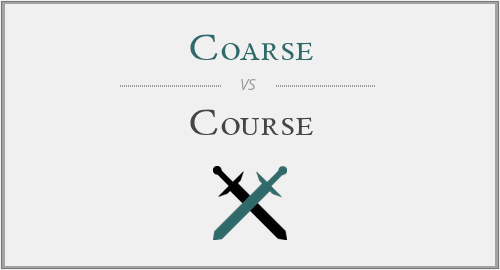This pair is pretty tricky, that's true, because they sound the same and it is also easy to misspell "coarse" and "course". But after a short review of what meaning each word carries, things will clear out right away. Let's take a closer look to these!
Coarse vs. Course
To begin with, the first thing to help you spot the difference between "coarse" and "course" from a first glimpse is what part of speech each is. "Coarse" is always an adjective, and you can remember this easily because "a", the first letter of "adjective", is present in the word "course" and not in "course". The latter is a noun.
When do we use "coarse"?
As an adjective, "coarse" is always used before nouns, with the purpose of describing them. "Coarse" primarily means rough, thick, or it may refer to not very small pieces. And secondly, "coarse" can also be used metaphorically, as a synonym for impolite.
Example 1: His voice was coarse, his gaze focused, the war has changed him significantly. - "coarse" refers to deep, rough, thick voice.
Example 2: The dog was fed some old coarse breadcrumbs and ate them immediately, he was that hungry. - "coarse" can also describe big pieces.
Example 3: The kids were using a very coarse language for their age. - sometimes, "coarse" also carries the meaning of "not polite".
When do we use "course"?
"Course" is a complex noun, carrying multiple different significations and used in several various expressions. Let's try to cover most of them so you get a good understanding of all the right contexts where you can use "course". The word can refer to a set of lessons, it can define a part of meal, a sport, a number of medical treatments, route or direction, order or action, and even development.
Plus, you will find it very often in structures such as "of course", or "of course not", used to put some more emphasize on a statement. Now let's take all these concepts defined by "course" and illustrate them in relevant examples:
Example 1: I attended a course in accounting in order to qualify for this job. - "course" defines a serious of lessons on a certain subject.
Example 2: What's the main course for tonight's dinner? - here, "course" defines the main part of the meal.
Example 3: That's a long golf course, are you sure we have time for it? - "course" can also refer to a special area for a certain sport or race.
Example 4: We will schedule a course of antibiotics and see how your infection evolves. - in medicine, "course" defines a fixed number of regular medical treatments. It's used with this meaning mainly in UK.
Example 5: Follow the course of the water to get to the closest village. - "course" can be synonym with "direction" or "route".
Example 6: The course of the events that night was unexpected. - "course" can also refer to order of actions.
Example 7: Pollution is changing the natural course of life, especially for certain animals and plants. - nonetheless, "course" can also refer to development, to the way something usually evolves during time. In this situation, the word is never used in plural.
Example 8: Of course I'm going to help you, you're my best friend! - used in this type of expressions, "course", or more accurately "of course" has the purpose of putting more emphasize on the affirmation that follows.
Conclusion
As you can see, the noun "course" carries a complex number of significations, but amongst which "coarse" can never be found because it's an adjective that has a totally distinct definition. The simplest way to remember the main difference is the trick we showed you in the beginning of the article. It's the best method to remind you that "course" should never be confused for "coarse".





Have a discussion about this article with the community:
Report Comment
We're doing our best to make sure our content is useful, accurate and safe.
If by any chance you spot an inappropriate comment while navigating through our website please use this form to let us know, and we'll take care of it shortly.
Attachment
You need to be logged in to favorite.
Log In